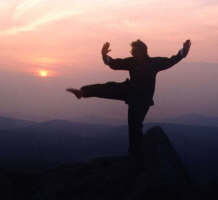
T'aï-Chi-Chuan is a Chinese martial art. It is the most popular gymnastics in China, played at the daybreak in small public gardens. The T'aï-Chi is also named “the circulation of the chi".
This term is translated by "Energy" or "Breath", translation recalling energy, physical or moral force of an organism. Another way to translate "chi" is vital Energy.
T'aï-Chi-Chuan recalls at the same time a slow dance and a fight with slow motion. It is a question of performing slow and flexible gestures. Besides, breathing is one of the centers of the discipline ; it must be slow and deep.
This term is translated by "Energy" or "Breath", translation recalling energy, physical or moral force of an organism. Another way to translate "chi" is vital Energy.
T'aï-Chi-Chuan recalls at the same time a slow dance and a fight with slow motion. It is a question of performing slow and flexible gestures. Besides, breathing is one of the centers of the discipline ; it must be slow and deep.
Movements aren't unpredictable, they are codified and belong to the education :
- keep the summit of the skull from above,
- let shoulders fall,
- do not use force,
- remain always discharged,
- accomplish fluid movements
- and make sequence of movements.
These sequences will develop suppleness, coordination and in a general way dynamism. So, T'aï-Chi-Chuan is a method to manage stress and find peace.
There are different applications of the T'aï-Chi-Chuan. First, someone can use blows hit with feet, knees, hands or elbows.
Then, it exist a T'aï-Chi by put pressures on holes to cause damage (respiratory or blood blockages) and on the points of acupuncture which can draw away disturbances of the organism (mental state, destruction of the internal organs, K.O or even death). In general, the T'aï-Chi-Chuan is played in bare hands, and there are forms of tai-chi with fan, dirk, sword, staff, sword.




